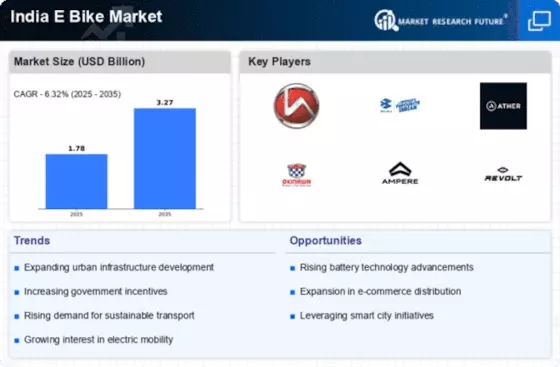Market Analysis
In-depth Analysis of India Electric Bike Market Industry Landscape
The market dynamics of electric bikes in India have undergone a significant transformation, propelled by a combination of environmental consciousness, urban mobility challenges, and advancements in technology. As India grapples with issues like air pollution and traffic congestion, electric bikes have emerged as a compelling solution to address these concerns. The demand for electric bikes has seen a notable upswing, driven by the need for sustainable and efficient modes of transportation in the country.
The Indian electric bike market is characterized by a diverse array of players, ranging from traditional two-wheeler manufacturers to innovative startups. Established companies have adapted to the changing landscape by introducing electric bike models, leveraging their expertise in the automotive industry. Simultaneously, startups are entering the market with agile and technology-driven solutions, contributing to the dynamic and competitive nature of the electric bike segment. This diversity in players fosters innovation and drives the development of a wide range of electric bikes to cater to different consumer preferences and needs.
Infrastructure development plays a crucial role in shaping the market dynamics of electric bikes in India. The availability of charging infrastructure is a key determinant of the widespread adoption of electric bikes. To address this, the government and private entities are investing in the establishment of charging stations across urban centers. This infrastructure development not only enhances the convenience of owning an electric bike but also addresses concerns about range anxiety, making electric bikes a practical and viable option for daily commuting.
Consumer awareness and acceptance are instrumental in shaping the market dynamics of electric bikes in India. As more consumers become environmentally conscious and seek sustainable alternatives, electric bikes have gained popularity. The lower operating costs, reduced environmental impact, and government incentives make electric bikes an attractive option for urban commuters. The ease of use and maneuverability of electric bikes make them well-suited for the congested and traffic-laden streets of Indian cities, further driving their adoption.
Government policies and incentives are pivotal in influencing the market dynamics of electric bikes in India. Initiatives like the Faster Adoption and Manufacturing of Hybrid and Electric Vehicles (FAME) scheme provide financial incentives to buyers of electric bikes, making them more affordable and accessible. State-level policies, such as subsidies and tax breaks, further stimulate the adoption of electric bikes. These policy measures not only support the growth of the electric bike market but also align with the government's broader vision of promoting sustainable and clean mobility solutions.
Despite the positive momentum, challenges exist in the Indian electric bike market. Limited awareness among consumers, concerns about charging infrastructure in certain regions, and the need for more affordable models are obstacles that need to be addressed. However, ongoing technological advancements, collaborations between stakeholders, and continued government support are expected to overcome these challenges gradually.
The market dynamics of electric bikes in India are experiencing a transformative shift, driven by a convergence of consumer awareness, technological innovation, infrastructure development, and government support. Electric bikes are emerging as a practical and sustainable solution to address the challenges of urban mobility in the country. As the market continues to evolve, collaboration between the government, industry players, and consumers will be crucial in shaping a vibrant and sustainable electric bike ecosystem in India.


















Leave a Comment